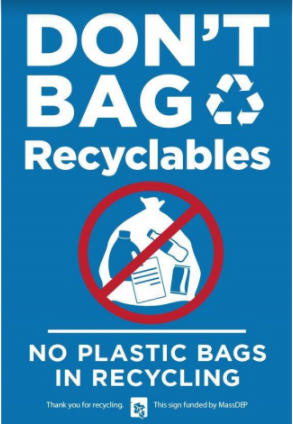By Stephen Sarnosky
***
[broadstreet zone=”59982″]
FRAMINGHAM – Is Your Recycling Due Diligence Going To Waste?
With Framingham’s Plastic Bag Reduction Ordinance banning the distribution of single-use plastic bags at grocery stores and retail establishment having gone into full effect, the uninitiated have been busy packing their recyclables into the ubiquitous black plastic trash bags and then recycling them into the curbside carts.
Framingham uses E.L. Harvey and Sons of Westborough as their Material Recovery Facility (MRF). In short, a MRF operator takes in recyclables and sorts them for sale.
In a discussion I had with E.L. Harvey & Sons, the City’s recycling processor, I asked if plastic bags are a problem and does the MRF open bags of any kind in order to process what’s inside? The answer was short and quick. Yes and No.
[broadstreet zone=”59983″]
Although plastic bags can be recycled they cannot be processed at the MRF individually, but rather must be brought to them in clean condition and in bulk.
An impossible task for curbside recycling.
In addition, plastic bags cause havoc with automated processing equipment costing both time and money for repairs and lost productivity.
With the lack of single-use plastic bags available at grocers in Framingham and some surrounding towns, Framingham DPW is beginning to see the use of plastic trash bags, specifically those used for under cabinet trash receptacles showing up in recycling carts.
To combat this resurgence, the DPW’s Sanitation Division conducts education oriented
recycling cart audits to alert well intended recyclers not to bag their recyclables whether in plastic or paper bags. Recyclables should be placed loosely in carts.
[broadstreet zone=”59984″]
Because the majority of MRF processing is done using automated sorting equipment, anything inside a bag is unceremoniously discarded as solid waste and subsequently will never realize its full recyclable potential, but rather will end up in a distant landfill or worse, pollute our oceans and waterways.
The City does a very good job at holding the line when it comes to recycling contamination. However, we are a community and it’s the community that reaps the benefits when everyone participates. With continued education and good practice, we will position ourselves for greater financial opportunities.
[broadstreet zone=”70107″]
***
Stephen Sarnosky is the City of Framingham’s Recycling Coordinator. he writes an occasional column for SOURCE since Spring 2019.


